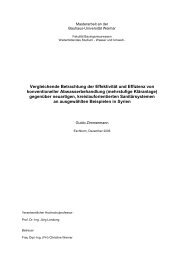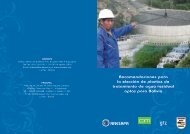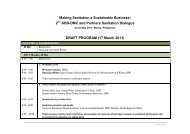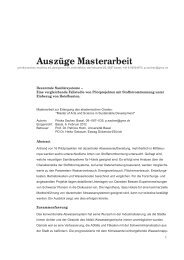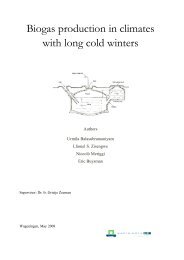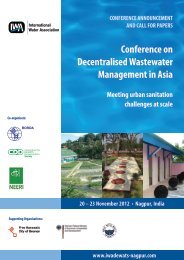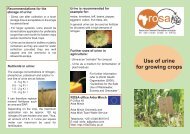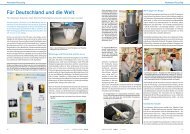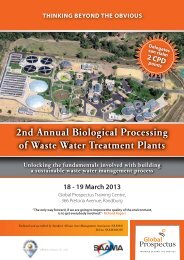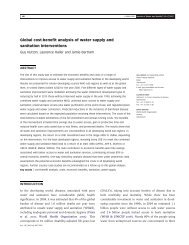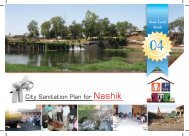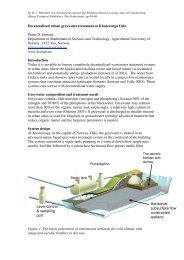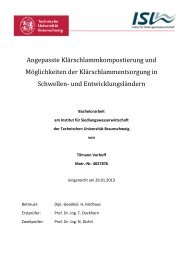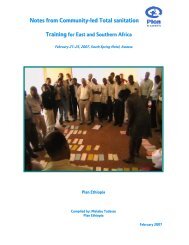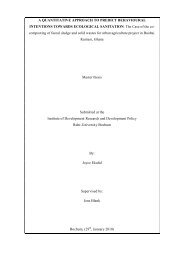MASTER'S THESIS - SuSanA
MASTER'S THESIS - SuSanA
MASTER'S THESIS - SuSanA
You also want an ePaper? Increase the reach of your titles
YUMPU automatically turns print PDFs into web optimized ePapers that Google loves.
7 Presentation of the institutional framework<br />
• Implementation of government decision towards aggregation of water utilities „into few, larger<br />
service providers“ in order to realise the „economics of scale“ to increase efficiency (MPWT 2011).<br />
• Establishment of a national training and certification programme for all utilities.<br />
Additionally, the private sector participation is mentioned as a key element of the sector startegy to „bring a<br />
more commercial approach to infrastructure provision“ through competition and to reduce political<br />
intervention (MPWT 2011). Incentives shall be provided for private companies to get involved in the water<br />
sector. In general, the water supply and sanitation (WSS) sector was recognised as important for “economic<br />
and social development of the country” (Blaschke et al. 2011) and it can be hoped that the rural areas will<br />
be considered more in the future planning.<br />
Even though the paper should address the problems of drinking water supply and wastewater treatment<br />
and discharge, the wastewater problems of the rural areas stay neglected.<br />
7.1.2 Masterplan for water sector<br />
The Masterplan for the Albanian water sector has the goal to identify priorities of the sector until 2040 and<br />
is financed by KfW. The development of the Masterplan is still going on at the moment. While the company<br />
IC Consulenten is working on the water supply part, the wastewater part is covered by the company IGR<br />
Engineers. All given information are gathered from the Masterplan Interception report- Final (November<br />
2011, (Blaschke et al. 2011)), meetings with Andrian Vaso from IC (December, 13 th 2011) and Karlheinz<br />
Stransky from IGR (December, 14 th 2011) and a meeting of GIZ and IC Consulenten at the GIZ office (January,<br />
19 th 2012) to prepare the prioritisation criteria.<br />
The development of the Masterplan follows several steps or phases. In the 1 st phase a baseline report was<br />
prepared that gives an overview over the sector issues, namely financial, social and governmental issues.<br />
The baseline report was finished in 2011.<br />
The 2 nd and 3 rd phase are going on in parallel. In the 2 nd phase a description of the current situation of<br />
infrastructure conditions is prepared. Albania has 58 utilities and is divided in the Masterplan in areas<br />
covered by utilities and areas that are not covered (OJ, what stands for „out of jurisdiction“). Data will be<br />
transferred into GIS format.<br />
A presentation of future needs is prepared as the 3 rd phase. The needs will be figured out by the use of<br />
questionnaires. Questionnaires were sent to all utilities and all OJ at the beginning of 2012. The<br />
questionnaires for the utilities shall help to collect data for the five main fields drinking water supply,<br />
wastewater discharge, financial, social and environmental aspects. Questionnaires for the OJs will be sent to<br />
the municipalities/communes and contain less questions. This study shall be finished by mid-February 2012.<br />
In the 4 th phase, the development of water demand schemes of Albania and the preparation of a table for<br />
prioritisation are targeted, divided into short-term (until 2015), mid-term (until 2020) and long-term (until<br />
2040) actions. In January and February 2012, the consultants that work on the Masterplan met 23<br />
stakeholders of the water sector to ask for their ideas concerning how to set up a scheme to evaluate the<br />
necessity of actions and the necessary criteria (e.g. water quality and supply hours, health risks,<br />
environmental risks, costs of measure). The prioritisation process consists of (Blaschke et al. 2011):<br />
• Conduction of availability analysis; data collection and verification<br />
• Identification of problem areas and assessment of urgency<br />
• Elaboration and evaluation of competing solutions or projects.<br />
85



